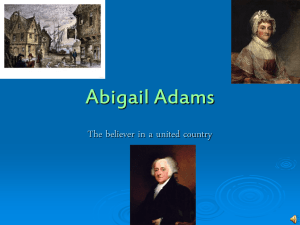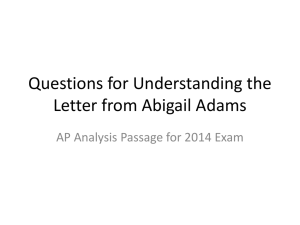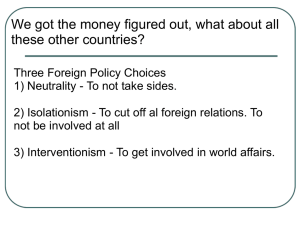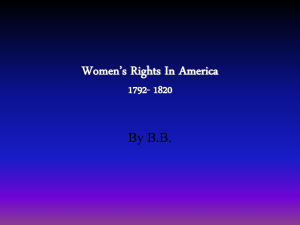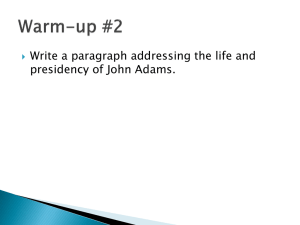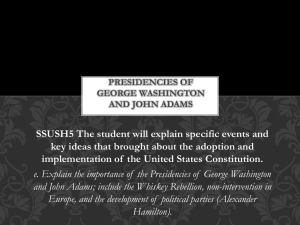M: The private issues addressed by A. Adams in her letter include
advertisement
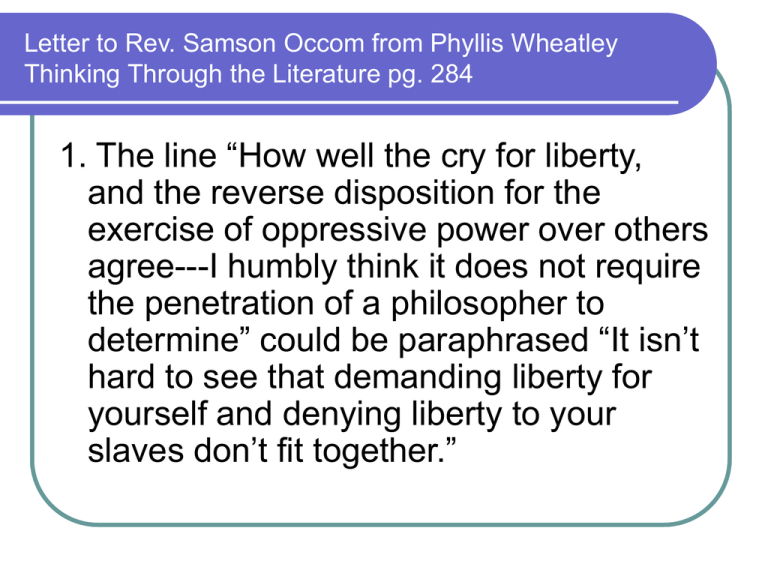
Letter to Rev. Samson Occom from Phyllis Wheatley Thinking Through the Literature pg. 284 1. The line “How well the cry for liberty, and the reverse disposition for the exercise of oppressive power over others agree---I humbly think it does not require the penetration of a philosopher to determine” could be paraphrased “It isn’t hard to see that demanding liberty for yourself and denying liberty to your slaves don’t fit together.” Letter to Rev. Samson Occom from Phyllis Wheatley Thinking Through the Literature pg. 284 2. M: Phyllis Wheatley’s attitude towards the Rev. Samson Occom is respectful, while her attitude toward slaveholders is one of tempered anger. E: In sharp contrast, Wheatley addresses Occom as “Reverend and Honored Sir” at the start of the letter while later comparing slaveholders to “Egyptians” that oppressed Jews. L: Evidently, Wheatley did not hold a slaveholder in the same esteem as the Reverend Samson Occom. Con: In brief, Wheatley felt that the “cry for liberty” must be heard for all Americans. Letter to Rev. Samson Occom from Phyllis Wheatley Thinking Through the Literature pg. 284 3. M: Phyllis Wheatley feels that God granted every human a love for freedom. E: She states, “in every human breast God has implanted a principle, which we call love of freedom” and hopes God will help slaveholders to see the “strange absurdity of their conduct” in regards to slavery. L: In essence, Wheatley hopes God will make slaveholders see how absurd it is to demand freedom for themselves but deny freedom to slaves. Con: Overall, Wheatley expresses the concerns and feeling of an non-existent voice within the country. Letter to John Adams from Abigail Adams Comprehension Check and Think Critically pg. 287 • • A. Adams warns that arbitrary power is usually broken, and that women not only free themselves but subdue their “masters” in regards to the congressmen’s treatment of the ladies. According to A. Adams, public responsibilities should take precedence over personal concerns. Letter to John Adams from Abigail Adams Comprehension Check and Think Critically pg. 287 2. M: The private issues addressed by A. Adams in her letter include her loneliness caused from being separated from her husband along with their children’s upbringing; the public issues addressed include the vulnerability of Boston to invasion, lack of government stability, and the need to create a stable and assertive government to support liberty and the rights of women. E: In regards to private issues, she states, “How many solitary hours I spend, ruminating upon the past” while speaking about her loneliness; also, that their children would “be indulged with the example of a father” when speaking about the absence of J. Adams. In regards to public issues, A. Adams feels that “very little has been done” to “secure” Boston from “future invasion”; also, that men “insist upon retaining an absolute power over wives” while speaking of liberty for all. L: Ultimately, Abigail Adams expresses much concern for the well-being of her family and country, though her views may be different than that of her husband. Con: Conclusively, even if the voice of women was not fully heard during our country’s turbulent beginnings, the concerns of one women was voiced to an important founding father. Letter to John Adams from Abigail Adams Comprehension Check and Think Critically pg. 287 3. M: Abigail Adams loves her husband and supports his work, even though she is ironic about his absence and attitude towards women. E: A. Adams speaks of how the “domestic pleasures and enjoyments are absorbed in the great and important duty you owe your country” when speaking to her husband, yet also complains of the “solitary hours” while he has only a “few moments to devote to any individual”; also, she speaks about how J. Adams is not “very generous to the ladies” while exercising “absolute power” in regards to the rights of men over women. L: These previously stated facts give insight into the mixed feelings Abigail Adams has not only towards her husband, but her country. Con: In essence, the wife of one of our most famous founding fathers felt her husband was flawed. Letter to John Adams from Abigail Adams Comprehension Check and Think Critically pg. 287 4. M: Based upon descriptions in Abigail Adams letter to John Adams, one can infer conclusions about her attitude towards public issues. E: For example, A. Adams states that “if our country perishes, it is as impossible to save an individual,” leading one to believe that she is dissatisfied with the actions of Congress; also, she believes that “if a king let his people slip from him, he is no longer a king,” offering clear evidence that the colonies should declare complete sovereignty over Great Britain and has very little respect for the king---the line also lends itself to the notion that she is dissatisfied with John Adams as king of the household, as well. L: In essence, Abigail Adams letter functions not only as a complaint against Congress and Great Britain, but her husband, too. Con: In conclusion, Abigail Adams demonstrates that the political workings of our country mirrors the domestic workings at home.
